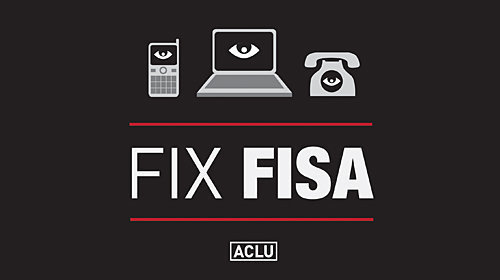Broad Range of Organizations Support ACLU Challenge to Warrantless Wiretapping at Supreme Court


Last week, the ACLU filed a brief with the Supreme Court in a long-running constitutional challenge to the Foreign Intelligence Surveillance Act Amendments Act of 2008 (FAA), a statute that gives the National Security Agency (NSA) expansive power to conduct dragnet surveillance of Americans’ international communications. The ACLU’s lawsuit is before the Supreme Court on the question of whether the plaintiffs—a coalition of professionals whose work requires confidential or sensitive international communications—have “standing” to challenge the law. We argued in our brief that the plaintiffs have standing because the FAA forces them to take costly and burdensome measures to avoid surveillance of such communications. The appeals court agreed, and on October 29, the Supreme Court will hear oral argument to consider the issue.
This week, a wide range of organizations filed friend-of-the-court briefs in support of the ACLU’s clients. The nine briefs include submissions from lawyers, journalists, civil liberties organizations, and even a gun owners’ association.
Many of the briefs point out that the FAA lacks safeguards that are essential to protecting Americans’ privacy rights. A brief from former members of the Senate’s 1975 “Church Committee”—whose investigation led to the enactment of the Foreign Intelligence Surveillance Act in 1978—states,
Respondents challenge the FAA because it allows intelligence agencies to conduct surveillance without the judicial safeguards that Congress, based on the findings of the Church Committee, had considered essential to protect Americans from unlawful and unconstitutional executive abuses.
The Reporters Committee for Freedom of the Press argues that the FAA directly inhibits the ability of journalists to acquire and report sensitive information from international sources. The Committee elaborates,
[I]t is only through journalists’ reliance on confidential sources that many reports of government misconduct that otherwise would have remained shielded from public scrutiny have been revealed. As such, journalists—and by extension the public—are harmed by the government intrusion into their communications with international sources authorized by the Act.
The New York State Bar Association explains that the FAA compels lawyers to take costly and burdensome measures to protect their communications from the possibility of surveillance. The Association writes: attorneys “no longer have a reasonable expectation of privacy in their communications with non-citizens outside of the United States in connection with client matters. Consistent with the canons of ethics, the attorney-respondents have incurred and will continue to incur time and expense using alternative means of communication.”
Amici representing international human rights and civil liberties organizations from countries such as Canada, Argentina, Egypt, and the United Kingdom stress the need for “a meaningful opportunity to challenge the legal framework that creates the threat of surveillance.” They note:
Historical experience has demonstrated that where surveillance is reasonably likely, people modify their behavior. Measures taken to avoid surveillance or mitigate its effects were and are a direct consequence of potential government monitoring of communications—particularly when the communications in question concern confidential or otherwise sensitiveissues.
The Constitutional Accountability Center concisely captures what is at stake in the ACLU’s lawsuit:
While the government suggests that the separation-of-powers concerns reflected in standing doctrine support blocking access to the courts in this case, history shows that allowing the judiciary to check legislative infringements on individual rights is essential to our constitutional system. Indeed, it was the assurance of robust judicial review of legislative action that encouraged the supporters of the Bill of Rights. Concerned that an enumeration of fundamental rights could end up as merely a parchment barrier to tyranny, the supporters of the Bill of Rights counted on the availability of meaningful judicial review to protect the rights and liberties set forth in the Amendments.
Here is a full list of the amicus briefs:
Canadian Civil Liberties Association, et. al.
Constitutional Accountability Center
Former Church Committee Members and Staff
Gun Owners Foundation, et. al.
National Association of Criminal Defense Lawyers
New York City Bar Association: Committee on Civil Rights
New York State Bar Association
Reporters Committee for Freedom of the Press
The Center for Constitutional Rights, et. al.
Arguments will take place on October 29. Stay tuned.
Learn more about government surveillance: Sign up for breaking news alerts, follow us on Twitter, and like us on Facebook.

